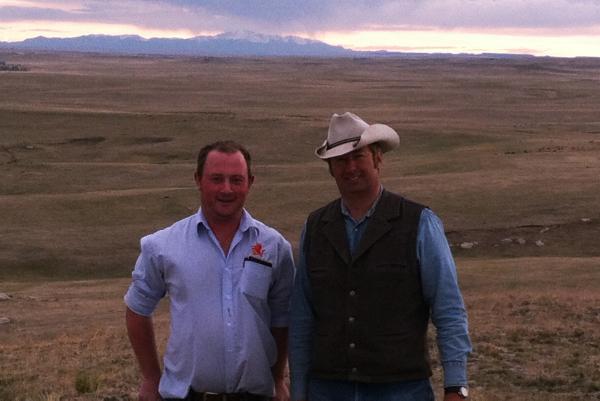I was also lucky enough to meet Cody McDaniel who I had been following on Twitter and is a producer for Pharo Cattle Company, I felt it was important to get the view of the producer on the ground and see what challenges they face as well as the idea makers.
What struck me about all three men was how they had simplified what we in Ireland spend hours talking about - the ideal sized suckler cow. According to these ranchers the ideal sized suckler cow is the cow that brings a calf to the weaning pen, is back in calf when she does so, and achieves this with minimum inputs. Fertility is the key in suckler cow production here with everything else a distant second.
These producers don't have the luxury of CAP payments and while they own a lot of land, environmental conditions are tough. They haven't had a year with more than 12 inches of precipitation since 2002; often up to 6 inches of this is in the form of snow. Due to these conditions and limited forage their stocking rate is one cow to 20-30 acres.
“You don't go to school to learn; you go to school to learn how to learn.” These were words echoed by Alex Laseter's grandfather Tom and struck a cord with me when I read some headlines from home. It was worrying, yet not surprising, to read this week that the biggest issue facing Austin Finn of the land mobility service was the attitude of young farmers.
We want it all and want it now. We view land and access to it as our most important resource yet we are quick to ignore something that is of equal if not more importance - experience. Older farmers have a wealth of it. They have made far more mistakes than us young farmers have and I view that as an important asset.
We can't get out the door of agricultural college quick enough and most of us thought we knew it all when we were there anyway. It was seen as a year or two that stopped us from farming rather than a period of time where new ideas on management could be learnt.
Farmers young and old are slow to use two of their most important assets - their ears. Listening and an ability to compromise are two of the most essential skills to bring to any partnership or group situation.
I know it took me a while to work that out. Some of the most important time spent on the farm for me are planning conversations with Dad. We talk through our ideas and plans regularly. Our aim is to eliminate the amount of mistakes we make without eliminating making mistakes. Because the day we stop making mistakes is the day we stop trying something new.




SHARING OPTIONS